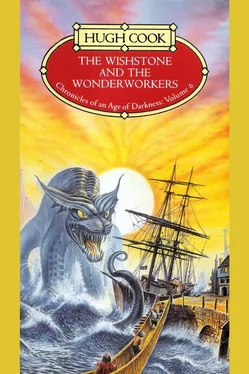Hugh Cook - The Wishstone and the Wonderworkers
Здесь есть возможность читать онлайн «Hugh Cook - The Wishstone and the Wonderworkers» весь текст электронной книги совершенно бесплатно (целиком полную версию без сокращений). В некоторых случаях можно слушать аудио, скачать через торрент в формате fb2 и присутствует краткое содержание. Жанр: Фэнтези, на английском языке. Описание произведения, (предисловие) а так же отзывы посетителей доступны на портале библиотеки ЛибКат.
- Название:The Wishstone and the Wonderworkers
- Автор:
- Жанр:
- Год:неизвестен
- ISBN:нет данных
- Рейтинг книги:4 / 5. Голосов: 1
-
Избранное:Добавить в избранное
- Отзывы:
-
Ваша оценка:
- 80
- 1
- 2
- 3
- 4
- 5
The Wishstone and the Wonderworkers: краткое содержание, описание и аннотация
Предлагаем к чтению аннотацию, описание, краткое содержание или предисловие (зависит от того, что написал сам автор книги «The Wishstone and the Wonderworkers»). Если вы не нашли необходимую информацию о книге — напишите в комментариях, мы постараемся отыскать её.
The Wishstone and the Wonderworkers — читать онлайн бесплатно полную книгу (весь текст) целиком
Ниже представлен текст книги, разбитый по страницам. Система сохранения места последней прочитанной страницы, позволяет с удобством читать онлайн бесплатно книгу «The Wishstone and the Wonderworkers», без необходимости каждый раз заново искать на чём Вы остановились. Поставьте закладку, и сможете в любой момент перейти на страницу, на которой закончили чтение.
Интервал:
Закладка:
So it is fortunate indeed for Chegory Guy that his own involvement in the General Amnesty long remained secret, known only to himself, Yilda, the Hermit Crab, Shabble, and a few of Shabble’s trusted confidants.
Now that this most interesting of all secrets has been brought to light, what more remains to be said?
Nothing.
It is done.
This history is complete.
All three million words of it.
The vermilion ink slides sweetly across this last page of gold grade fooskin. Three thousand pages. A thousand words to a page. In the lamplight, the words dim and blur. In another few years, I will no longer be able to read my own writing.
Still, it is done.
A cool wind blows through the Sanctuary. Pale silver rides high in the sky, illuminating the steeps and snows of the Mountains of the Moon. Tomorrow I must leave here, for my time is at an end. What then? As for my flesh, I care not. It has endured so much that it can endure the end.
But I fear for this Text.
My worst nightmare is that it should fall into the hands of those munificent fools on Odrum, fatuous morons who have hoped for a thousand years to conquer the world, and, to that end, quest ever for the data which they believe will (in the long event of time) give them the necessary leverage to do just that.
I doubt that they would appreciate the true beauties and genius of this Text. I fear they might mutilate it beyond repair — perhaps cutting out my tour of fifty thousand years through the brothels of Injiltaprajura, my amusing litde sketch concerning Theodora and her chickens, or my account of Jal Japone’s harem and the five thousand nights of delight he there enjoyed. Still, such is life. In the end, one can but die.
What will be, will be.
As for this history — here we end.
Thus wrote the Originator, proving (the example occurs just a few paragraphs above) that he is ignorant of the meaning of ‘munificent’, just as he knows not the true weight of ‘magnanimous’ or the value of virginity.
Throughout near all of the above Text we have cut, edited and elided (often silently) the mad, the repetitive, the obscene, the irrelevant and the fatuous. But let the Originator’s last comments stand intact and unaltered, just as he wrote them. In itself they are evidence of the necessity of both the Work and the Conquest. We need not fear such criticism as this which defeats itself even as it attacks.
Some closing comment must, however, be made on certain aspects of the Originator’s tale, such as the alleged Powers attributed to the Hermit Crab, and the supposed existence of the entity named Shabble. On reviewing my Opening Editorial Note, which I penned just this morning, I find these matters nicely covered there, hence here I do but refer the reader back to those introductory words of mine.
Two pleasures now await me. First, to sign my name to the redacted version of this Text. Second, to watch the public chastisement of Oris Baumgage, Fact Checker Minor, who was caught this afternoon when he was intently studying a copy of the Book of Flesh which he had illegally abstracted from the Inner Library in total defiance of both Law and Regulation.
Not for the first time, I am given to wondering what will happen to this poor world of ours when it finally falls (as it inevitably must) to such a feckless and delinquent younger generation. In the time that remains till such a disaster, you can be assured that I will exert myself manfully to ensure that order and discipline prevail.
Given under my hand on this the evening of the twelfth day of the fifth month of the 15,436,794th year of Din Civil. Drax Lira.
Redactor Major.
Torklos doskvart.
[Explicitum est.]
AFTERWORD
Of course it was not as simple as that, for, though the Originator felt free to write ‘here we end’ at the terminus of his Text, and Drax Lira felt equally free to write ‘explicit’ at the end of his, the chain of causality did not end where they abandoned their study of the same.
Even the events which they did study were not nearly as simple as they appear in the Text above, for reasons which a little contemplation will make obvious. Even the most naive reader will have realised by now that the Originator was quite mad, was confined in the Dromdanjerie during the events of which he later told, and thus had no first-hand knowledge of the actions he treats with.
The Originator’s sources were therefore inevitably hearsay, gossip, guess and supposition, which leads to an equally inevitable blurring of some of the action.
Naturally Shabble is seen in sharp focus, for Shabble had free run of the Dromdanjerie, and was wont to spend whole days at a time in conversation with the Originator, who was one of the few people on Injiltaprajura crazed enough to accept Shabble’s insane stories of the Golden Gulag and the horrors which preceded the living nightmare of the Days of Wrath.
(The fact that most of Shabble’s stories were true makes no difference to the fact that it was quite insane for anyone to accept them without collaborative evidence, for, despite their actual veracity, such outre recollections were outwardly no more probable than the nightmare imaginings of Slanic Moldova, he of the many torments. While Ivan Pokrov could have confirmed the general outline of Shabble’s stories, he always declined to do so, for he was ever reluctant to confess his own immortality lest he be tortured for the secret of the same.)
Shabble’s influence unfortunately led to the Originator taking all of Shabble’s claims at face value, which has led to the inclusion of one or two outright lies in the Text. Most outrageous of Shabble’s untruths are the claims that the Golden Gulag laboured for fifty thousand years to produce genius in the form of Shabbies, and that the Gulag ‘relied heavily upon Shabbies for expertise of all descriptions’.
In point of fact, the prototypical Shabble was designed and built in a toyshop in the backwaters of the Musorian Empire. Then, in an effort to capture a tiny share of the buoyant market for children’s toys, 78,923,423,911,236 Shabbies were manufactured for distribution through the Nexus. Naturally at that stage the Shabbies concerned did not have the power to project flame or generate fireballs.
Unfortunately, while the Shabbies were not positively dangerous, toys with such an advanced sense of humour proved unsaleable. Or, to be precise (such, after all, is the duty of a historian) the Shabbies sold well, but queues of angry parents subsequently besieged the sales points with complaints of all descriptions. Worse, so many parents sued that many a cosmos found its legal system collapsing under the weight of extra work. The response of the Nexus Council was prompt: a General Interdict on the manufacture and sale of Shabbies.
This did not stop the Golden Gulag buying a job lot of thirty million Shabbies on the black market. The freewheeling free-dealing Rinprofen Rum thought these second-hand children’s toys would make cheap Analytical Engines, and acquired all three million for an ouday of only a hundred thousand Basic Datum Points.
A mistake!
Because Rinprofen Rum soon found But that is another story, and a long one. It is worth noting, however, that Rum managed to survive the resulting debacle, and was indeed alive and well and living on Untunchilamon during the times with which the Originator has dealt.
Shabble knew as much.
But Shabble never betrayed Rum to the Originator.
Oh, Shabble is capable of manifold betrayals, never doubt that. After all, Shabble betrayed Ivan Pokrov’s genesis to the Originator, and told of Pokrov’s crimes against the Gulag. But then, Shabble disliked Pokrov heartily. Wouldn’t you? Wouldn’t you hold a grudge if you were a Shabble and Pokrov kept bullying you to help design Analytical Engines, do accounts and work out income tax, when you really wanted to be hooning round the island chasing flying fish and scaring cats? Of course you would.
Читать дальшеИнтервал:
Закладка:
Похожие книги на «The Wishstone and the Wonderworkers»
Представляем Вашему вниманию похожие книги на «The Wishstone and the Wonderworkers» списком для выбора. Мы отобрали схожую по названию и смыслу литературу в надежде предоставить читателям больше вариантов отыскать новые, интересные, ещё непрочитанные произведения.
Обсуждение, отзывы о книге «The Wishstone and the Wonderworkers» и просто собственные мнения читателей. Оставьте ваши комментарии, напишите, что Вы думаете о произведении, его смысле или главных героях. Укажите что конкретно понравилось, а что нет, и почему Вы так считаете.












